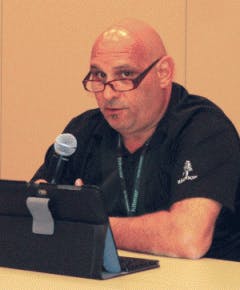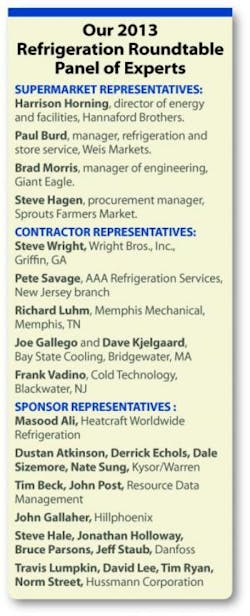Refrigeration Service Today: Let's Make a 'Cold' Career HOT!
During the most recent ContractingBusiness.com Refrigeration Roundtable, held in Philadelphia during Comfortech 2013 in September, Richard Luhm, president of Memphis Mechanical, offered up a humorous “solution” to the refrigeration industry’s technician shortage.
“Manufacturers have to start making equipment that can be repaired with iPhones. Then we’d find all kinds of technicians,” he said with a laugh.
His point was well-taken: the refrigeration industry has to become more exciting, current, and visible, to attract younger prospects to the career. (That’s right, it’s a career.)
The problem exists on two levels. First, refrigeration contracting firms say repeatedly, that vocational schools aren’t providing students with sufficient information and training in low and medium temperature refrigeration.
Second, the industry itself isn’t known or respected by high school counselors or parents — in part because they’re unaware of the good future the work provides; some parents dread the idea of subjecting their babies to blue collar work; and, high school administrators want to advertise the number of students they send on to colleges, not to refrigeration schools.
But shouldn’t qualified, tech-leaning students have a chance to look into this career, and have a say in the matter? Our panel thinks so. Here’s a look at their opinions, and possible solutions.
Rework the Curriculum
“We have to get more involved with the curriculum that’s offered at technical schools,” said Joe Gallego, special projects manager for Bay State Cooling, Bridgewater, MA.
“Supermarkets exist in their own world,” Gallego said. “The two-year program I took years ago didn’t even mention the word ‘supermarket.’ You were taught how compressors and condensers work, but not what to expect in the field. Nothing about refrigeration racks or troubleshooting.”
Related articles
Refrigeration Roundtable Explores Alternative Refrigeration Systems
CB Refrigeration Roundtable: Commissioning 'TLC' Works Wonders
Steve Wright, president, Wright Bros., Inc., Griffin, GA says it’s déjà vu all over again.
“I’m a product of the technical college environment back in the 1970s, and it seemed like the statistics are the same. We had two or three guys in my class that I was with that actually made it in the industry or even“I talk to vocational instructors today and it seems the same,” Wright continued.
“Three or four percent of the class is interested in refrigeration. I wish there was a way to identify those interested and focus our efforts and energy on them.”
Tim Beck, general manager, Resource Data Management — an event co-sponsor — agreed that the supermarket service technician occupation is a very special niche that needs to become known by the educational gatekeepers.
“I was out in the field, I was in the trenches doing installations and everything else. It’s almost like we have to go back to the high school level, and let school counselors know that this niche is out there. Get the guys with mechanical aptitude, and say, ‘Hey, have you thought about refrigeration? It’s rewarding work, if you like that type of work. It’s not glamorous, but the benefits and self-pride you can get out of it are extraordinary.”
Career Pros & Cons
Why does the refrigeration industry get the short end of what is already a pretty small stick? Frank Vadino, vice president, Cold Technology, Blackwater, NJ recited a litany of facts that combine to make refrigeration service a challenging occupation.
“You’re on call. You have to work some weekends, and on occasion, you have to work holidays, and provide on call coverage in the middle of the night. You’re lifting heavy bottles of refrigerant. You’re changing out compressors. You’re changing condenser fan motors. When it’s hot outside, you’re in the motor room, which is hotter than it is outside, and when it’s cold, you’re up on the roof,” he said.
“We need to focus on doing more with less, or bring in a New York marketing firm to make the position sound a lot sexier than it is. Bring in signing bonuses, whatever it takes,” Vadino said.
"Refrigeration technicians have to perform at a higher level
than an HVAC technician, so that’s one of the things we try to
instill when we talk to prospective employees." — Frank Vadino
“And, it’s a very daunting task to attract, train, and retain qualified service technicians based on their job duties. So, from a contractor’s perspective, we need as much help and support as we can get from the manufacturers and industry trade associations.”
Vadino added, “Refrigeration technicians do get paid more, which is the only thing they’ve got going for them. They can make a nice buck in this industry; but they can also make a nice buck as a Microsoft-certified network engineer.
“We need to rely on technology. We need to make the systems simpler, easier to work on, and make the job more glamorous than it is. Also, refrigeration technicians have to perform at a higher level than an HVAC technician, so that’s one of the things we try and instill when we talk to prospective employees,” Vadino said.
Smaller Industry to Begin With
Steve Hagen, procurement manager, Sprouts Farmers Market, added that another factor that works against refrigeration, is the relative size of the supermarket realm compared to the HVAC industry.
“The supermarket industry isn’t as big as people think. We run into the situation every day: why would a manufacturer modify a piece of equipment for only one percent of its business model? It’s the same thing with HVAC technicians,” Hagen continued.
“In the past 30 years, I’ve never seen a trade school advertising about ‘coming to our refrigeration school.’ They always talk about HVAC and a 90% fill rate, and extra money. You almost do need a New York marketing firm to revitalize the attraction of it, and tell people about it.
“I also think four 10-hour days would help. And if they’re only on call one week out of every eight or 10, it might not seem as bad,” Hagen added.
Hagen continued by saying he believes the industry’s technicians are actually underpaid in comparison to their employers’ expectations.
“They’ve actually become computer technicians. Many of the guys have to do some programming at some time. Everything’s become much more sophisticated and they have to be much more knowledgeable than they were in the past.”
“Four 10-hour days would help. And if they’re only on call one week
out of every eight or 10, it might not seem as bad.” — Steve Hagen
Steve Hale, business development manager, electronic controls for another event co-sponsor, Danfoss, had an interesting observation that speaks to industry image and work requirements.
“When I visit a project, wearing my white Danfoss shirt, almost all of your technician employees are asking me, ‘How did you get into controls? How can I do that?’ It’s a very common thing. They’re looking for ways to move out of working nights, weekends, and holidays,” Hale said.
Hagen suggested that there are a variety of incentives that contractors can try, to retain the employees they have, and to make the job more appealing.
“Perhaps you could have regular competitions, such as ‘lowest store energy use in a district,’ ‘lowest refrigerant use for a district,’ ‘lowest numbers of service calls.’ Do everything you can to create competition among the technicians.”



